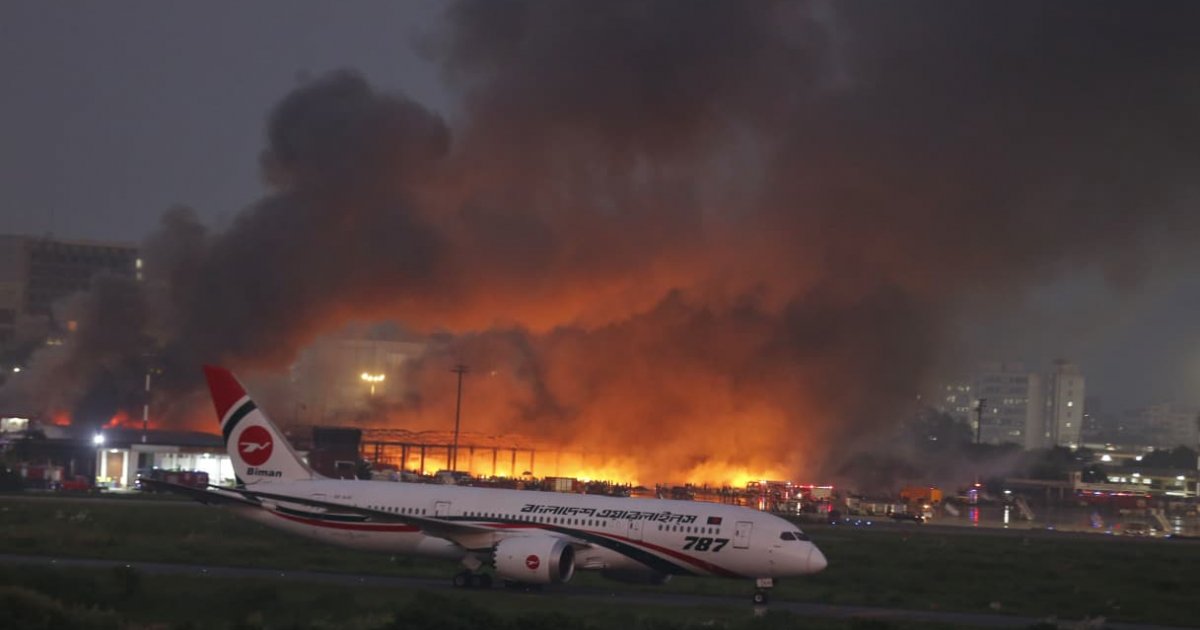A devastating fire at the import section of Dhaka’s Hazrat Shahjalal International Airport’s Cargo Village has sent shockwaves through Bangladesh’s business community, threatening the country’s export supply chain ahead of the crucial Christmas season.
The blaze, which broke out Saturday afternoon, destroyed a vast quantity of goods and raw materials, affecting key sectors including readymade garments, pharmaceuticals, electronics, telecom, and small businesses.
The Exporters Association of Bangladesh (EAB) estimates the losses could exceed $1 billion, or Tk12,000 crore.
Among the items gutted were garment samples, zippers, buttons, pharmaceutical ingredients, telecom components, and cosmetics—many of which were essential for ongoing production and shipment.
Exporters warn that delays or cancellations from international buyers could severely impact Bangladesh’s garment sector, which is already under pressure from global competition and rising costs.
Faisal Samad, director of the Bangladesh Garment Manufacturers and Exporters Association (BGMEA), said the destruction of samples and inputs could derail contract renewals and new orders.
“Even a week’s delay during the Christmas season causes major losses,” he told Dhaka Tribune.
Series of blazes
The Cargo Village fire follows a series of recent industrial blazes in Ashulia, Mirpur, Chittagong EPZ, and Incepta Pharmaceuticals, prompting concerns over systemic administrative failures.
EAB President Mohammad Hatem criticized the lack of automatic fire detection systems at such a critical facility, saying: “Civil Aviation, Customs, and Biman Bangladesh—no one can escape responsibility.”
He called for a transparent investigation to determine whether the fire was accidental or deliberate.
The incident adds to a growing list of challenges for businesses, including rising bank loan interest rates, inflation, and declining consumer purchasing power.
The recent imposition of a 20% countervailing duty on Bangladeshi garments and leather goods in the US has further intensified pressure on exporters.
Pharmaceutical sector hit hard
The pharmaceutical industry has also suffered a major blow.
According to Bangladesh Pharmaceutical Industry Association (BPA) Secretary General Md Zakir Hossain, raw materials worth Tk200 crore from 32 leading companies were destroyed, potentially disrupting the production of medicines worth Tk3,000 to Tk5,000 crore.
Many of these materials are temperature-sensitive, raising concerns about their viability even after being moved to Chittagong Airport.
Muhammad Halimuzzaman, managing director of Healthcare Pharmaceuticals, warned that without immediate government intervention, the pharmaceutical supply chain could collapse.
Small traders face ruin
Small businesses are among the worst affected.
Muhibul Islam, a Motijheel-based importer, lost cosmetics worth Tk40 lakh in the fire.
“We spend the entire year preparing for the winter season. Everything was destroyed—and it wasn’t even insured,” he said.
Many small traders now face bankruptcy.
Business leaders have long criticized the lack of proper storage and fire safety at Cargo Village, where goods are often kept in open-air conditions.
The Dhaka Customs Agents Association blamed poor coordination between civil aviation and fire services for the scale of the damage.
Commerce Adviser Sk Bashir Uddin said that 37 fire units responded within 30 seconds of the alert and assured that a full investigation—including the possibility of sabotage—is underway.
Reputation, trust at stake
Beyond financial losses, the fire has damaged Bangladesh’s reputation among international buyers.
“This is not just about goods—it’s about trust,” said EAB President Mohammad Hatem.
Former BAFFA vice president Nurul Amin added that the incident will increase pressure on air transport, especially as many shipments had already been diverted from Chittagong Port due to strikes.
The Exporters Association of Bangladesh (EAB) has issued a six-point demand to the government in response to the Cargo Village fire.
These include the speedy settlement of insurance claims for damaged goods and the creation of a government fund to support uninsured victims.
The EAB also called for the modernization and expansion of Cargo Village, the establishment of dedicated air-conditioned warehouses for pharmaceutical storage, the relocation of chemical storage facilities to safer distances, and the implementation of fully technology-driven warehouse management systems.
They also called for a joint investigation commission comprising government and business representatives.
Economic uncertainty deepens
The fire compounds an already fragile economic environment.
According to Bangladesh Bank, high interest rates, inflation, and a dollar crisis have increased business costs.
Experts warn that unless infrastructure and policy reforms are enacted, Bangladesh risks losing its competitive edge.
BGMEA Senior Vice President Enamul Haque Khan cautioned that buyers may turn to alternative sourcing countries if confidence isn’t restored quickly.
While the government has temporarily allocated space in the airport’s third terminal, he stressed that “without a long-term security plan, the same incident could happen again.”
Adding to the crisis, private sector credit growth fell to 6.35% in August 2025—the lowest since 2003.
This marks a sharp decline from 10.13% in July 2024.
Economists attribute the slowdown to high interest rates, political uncertainty, and waning investor confidence.
The Cargo Village fire has exposed deep vulnerabilities in Bangladesh’s trade infrastructure.
As exporters, small traders, and industrial leaders grapple with the fallout, the country faces a larger challenge: restoring trust, ensuring safety, and stabilizing the business environment in an increasingly competitive global market.



